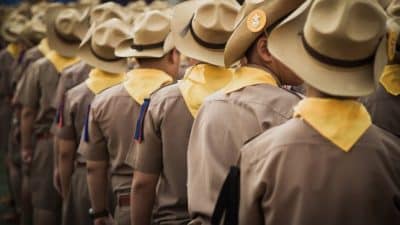
It was then that I glanced out of the nearby plastic window. Ten feet in front of me was a police car. Two policemen were trying to get a handcuffed man in a gray hoody into the back seat of the squad car. I was close enough to see the policemen’s faces straining with effort as they tried to fold the man’s rigid body into the back seat. After a few moments, one of the officers went through the other back door and helped pull the unwilling rider into the car. The entire incident took less than three minutes. I didn’t know who the man was or what he had done. However, I did I notice my reaction to the incident. After scanning the scene I immediately searched the face of the hooded man in order to identify his race. I couldn’t see him clearly, it was dark, he had a hood over his head, and the incident lasted only a few moments, but in my mind’s eye I saw clearly two white cops and a black man in handcuffs, an image so familiar that I could construct it out of a dimly lit scene.
As each ensuing moment of the Obama presidency is photographed, filmed, downloaded and broadcast a new image, an unfamiliar image will be presented to the American psyche. For those of us already trained to expect to see black men in handcuffs more so than in business suits, it may require some time to get used to the image of Barack Obama sitting in the Oval Office, shaking hands with world leaders or boarding Air Force One. It undoubtedly will be difficult for some Americans to think of him as “our” president when we have been used to our leaders being white men. But President-elect Obama was indisputably elected, and if his election does indeed usher in a new political era, it will also create a unique opportunity to examine ourselves as a member of a race, as a citizen of a nation and a part of what has never existed in the world, one nation of many races.
Although it is tempting to consider Obama’s victory as an inevitable result of American’s upward march toward racial equality, the history of American race relations shows that negative reactions, setbacks and backlashes often follow victories. Reconstruction was followed by 50 years of legislated Jim Crow in the South, defacto Jim Crow in the North as well as unprecedented violence against black people. Just as civil-rights laws did not change all hearts and minds, neither can the election of an African-American address continued racial disparities or racist notions. The thoughts and feelings that are spurred by images of white policemen and a black man in handcuffs; of a group of brown men climbing a border fence or for that matter, images that render Asian-Americans invisible and Native Americans virtually absent, all point to a need for the substantive dialogue on race that we, as a nation, have never had. The power of images is that they elicit feelings, feelings influence beliefs and beliefs can eventually become public policy. Hence, there are reasons that black men are disproportionately jailed in our country and that a fence is being built on our southern border. It will be left to historians to debate whether Barack Obama could have been elected president under anything less than the direst of national circumstances. However, the real legacy of the first African-American president will be how personal attitudes, community actions and legislative policies that adversely affect people of color will change in America as a result of his election. That is the change we all need.
– Column by Cheryl Talley, Harrisonburg










